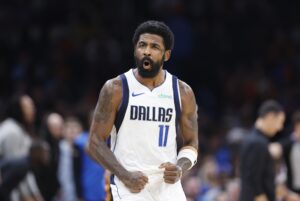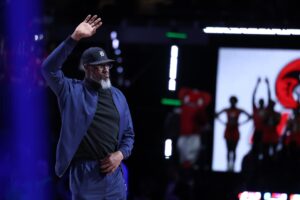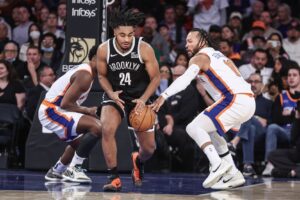LWOS has been choosing the best player, team, and coach from every power conference. Here, the LWOS Pac-12 All-Time Series continues from Part 1.
Pac 12 All-Time Series Part 2
Stanford Cardinal
Best Team: 2000-01
The 2000-01 Stanford Cardinal squad was a consensus elite team, as they were ranked fourth in the preseason AP poll. They somehow exceeded the hype in the regular season, going an incredible 31-3 en route to being ranked second in the nation.
This team was feared for its extremely efficient offense, as they were first in the nation in field goal percentage and second in three-point percentage. Led by future NBA players Casey Jacobsen, Jason Collins, Jarron Collins, and Curtis Borchardt, the Cardinal were widely expected to win the Big Dance. Sadly, they were ultimately upset in the Elite Eight by a streaky Maryland team.
Best Player: Casey Jacobsen
Casey Jacobsen played for Stanford from 1999-2002. He averaged 18.1 points, 3.8 rebounds, and 2.7 assists in four seasons, all while shooting a sizzling 42.7 percent from downtown and 47 percent from the field. The sharpshooter was a three-time All-Pac-10 selection, as well as a 2001 First Team All-American. Jacobsen led the team during perhaps the greatest period of Stanford basketball, as he oversaw two number one seed squads and only lost a measly seventeen games total.
Best Coach: Mike Montgomery
Mike Montgomery coached at Stanford from 1986-2004, and he led the Cardinal to their most successful stretch of basketball in history. He had over a 70 percent win percentage, and his teams made the Big Dance in nine consecutive years. Despite his great success in the regular season, Montgomery could never get over the hump in the NCAA tournament.
Of the five seasons where Stanford ranked in the top ten, Montgomery led only one of these teams to the Final Four. Despite his postseason failures, Montgomery’s tenure can be looked at as nothing but exceptional. He turned around a historically mediocre team into a nationally reputable one. Sadly, in the sixteen years since he departed Palo Alto, the Cardinal have only made four more appearances in the postseason.
UCLA Bruins
Best Team: 1971-72
Not only is the 1972 Bruins squad the best squad in UCLA history, but it’s also considered the greatest collegiate team ever. Led by consensus First Team All-Americans Bill Walton and Henry Bibby, the Bruins absolutely dominated their opponents game in and game out. In fact, their average margin of victory was a whopping 31 points. Unsurprisingly, the Bruins won their sixth consecutive championship while going a perfect 30-0. The team was so dominant that the five-point margin of victory in the finals against FSU was only their second single-digit margin of victory of the entire year. Their level of perfection and dominance will certainly never be replicated again.
Best Player: Kareem Abdul-Jabbar
Kareem Abdul-Jabbar goes down as perhaps the greatest college basketball player in history. In three seasons with UCLA, he won a bevy of awards, including Player of the Year (1967 and 1969), and a spot on the First Team All-American roster (1967 and 1969), among others. He averaged an astounding 26.4 points and 15.5 rebounds, and he won three consecutive NCAA championships.
He goes down in the UCLA record books with the most points in a game, most points in a season, and most career field goals. Perhaps the stat that exemplifies his dominance is not a single number, but the fact that he single-handedly caused the dunk to be banned for an entire decade.
Best Coach: John Wooden
While John Wooden is indisputably the greatest college basketball coach in history, many argue that he is the greatest coach in history, regardless of sport. In sixteen seasons with the Bruins from 1959-75, Wooden compiled an extraordinary 620-147 record. Even more staggering was Wooden’s twelve-year run from 1963-75, during which he won ten championships in twelve years. In fact, in the seven years between 1966 and 1973, Wooden won a perfect seven championships while losing a minuscule five games in total. However you slice it, Wooden was simply incredible during his time with UCLA. His success was otherworldly, and it will almost certainly never be replicated again.
USC Trojans
Best Team: 2006-07
The USC basketball program has often been overshadowed by both its legendary football team and UCLA’s storied basketball program. Consequently, they’ve never assembled a basketball team able to survive deep into March Madness. Perhaps the best team in Trojans history is from 2006-07.
Led by Taj Gibson, the Trojans went an unremarkable 25-12, finishing third in the Pac-10. Entering the Big Dance as a five seed, the Trojans knocked off Arkansas and fourteenth ranked Texas to reach the Sweet Sixteen. Here, they were unceremoniously eliminated by perennial heavyweight North Carolina. While the season ended on a discouraging note, it nevertheless marked a high point for a basketball program riddled in controversy and disappointment.
Best Player: Harold Miner
Harold Miner had an incredible career with the Trojans during his three years in Southern California. Some accolades he received include the 1990 Pac-10 Freshman of the Year, 1992 Pac-10 Player of the Year, and a nomination as a 1992 Consensus First-Team All-American. His exceptional dunks earned him the nickname “Baby Jordan”, and he went on to win two NBA dunk contests.
Most famously, Miner controversially won the Sports Illustrated Player of the Year award over Shaquille O’Neal and Christian Laettner. Even though he never could advance past the second round of the NCAA tournament, Miner’s importance cannot be overstated. Against all odds, he helped bring USC basketball into the national spotlight with his high flying dunks and jaw-dropping posters.
Best Coach: Henry Bibby
This name may sound familiar, as Henry Bibby was aforementioned as an integral part of the legendary 1971-72 UCLA team. The father of former NBA star Mike Bibby was quite successful for the Trojans during his ten-year tenure from 1996-2005. During this time, Bibby won 252 games with a 52.4 winning percentage, leading the Trojans to three NCAA tournament appearances.
In his most memorable season, Bibby’s squad went to the Elite Eight, marking the most successful Trojans run during the modern era. Overall, Bibby had an unforgettable run as the coach of the Trojans. He established a culture change, and he was the first Trojans coach to truly bring in reputable recruiting classes.
Utah Utes
Best Team: 1997-98
The 1997-98 Utes were easily the best team in school history. Led by future NBA players Michael Doleac, Andre Miller, and Hanno Mottola, the Utes finished 30-4, good for the third seed in the NCAA tournament. This alone was surprising, as the Utes were supposed to take a step back following the departure of school legend Keith Van Horn.
Improbably, the Utes continued to surprise the nation, beating two straight number one seeds en route to the national championship game. Although they lost to Kentucky in the finals, Utah’s incredible season helped cement them as one of the premier teams in the nation under coach Rick Majerus.
Best Player: Keith Van Horn
Keith Van Horn played a major role in the revitalization of Utah’s basketball program from 1993-97. In four seasons, he averaged 20.8 points, 8.8 rebounds, and 1.0 blocks while shooting a solid 49.2 percent from the field. He is the university’s leader in points, three-point field goals, and free throw percentage.
Van Horn won a plethora of awards, including the WAC player of the year (1995-97) and 1997 ESPN Men’s College Player of the Year. He was also a consensus 1997 First-Team All-American.
Best Coach: Rick Majerus
Rick Majerus is the winningest coach in Utah history, and it’s not particularly close. In fifteen seasons from 1990 to 2004, he compiled an outstanding 323 wins with a 77.3 percent winning percentage. In total, he compiled 10 regular-season conference championships, four conference tournament championships, and 11 berths to the Big Dance.
He recruited well and coached even better, mentoring legends such as Keith Van Horn, Andre Miller, and Andrew Bogut. Since his departure, Utah basketball simply hasn’t been the same. In the sixteen years since Majerus left, the Utes have only qualified for four NCAA tournaments.
Washington Huskies
Best Team: 2004-05
It must be incredibly frustrating to be a Washington Huskies basketball fan. Despite eight attempts, the team has never managed to get past the regional semifinals in the modern era. The best of this bunch was the 2004-05 Huskies squad. These high-scoring Huskies were led by Nate Robinson and Brandon Roy. They went 29-6 and looked poised to make a deep run into the Big Dance. Alas, the number one seed Huskies lost to a strong Louisville team in the Sweet 16.
Best Player: Brandon Roy
Brandon Roy played for Washington from 2002-06. During his first three years, Roy was solid but unspectacular behind Nate Robinson. However, once Robinson left, Roy responded by putting together a season for the ages. He averaged 20.2 points, 5.6 rebounds, 4.1 assists, 1.4 steals and 0.8 blocks during his senior year, all while shooting a pristine 50.8 percent from the field and 40.2 percent from downtown.
As a result, he was the 2006 Pac-10 player of the year, and he was selected to both the All-Pac-10 First Team and the All-American First-Team. Manning the ship for a 26-7 Huskies team, Roy led his squad to a second consecutive Sweet 16.
Best Coach: Lorenzo Romar
Lorenzo Romar coached Washington for fifteen seasons, from 2003 to 2017. Under his watch, the Huskies emerged as a real threat in their conference. He led Washington to a school-record six NCAA tournament appearances, three of which were to the Sweet 16. Romar had a 298-196 record, good for a 60.3 winning percentage.
Washington State Cougars
Best Team: 2007-08
Washington State’s basketball program is the worst of the Pac-12, reaching only five NCAA tournaments in the modern era. Given the lack of selection, it’s easy to designate the 2007-08 Cougars team as the best in school history. Most notably, the Cougars had a gritty defensive identity. They allowed a Lilliputian 56.4 points per game, third-lowest in the nation.
The Cougars actually underperformed relative to expectations, however. They entered the season ranked tenth in the AP preseason poll, and by January they were ranked fourth overall with a perfect 14-0 record. Unfortunately, they underwent a brutal dry spell, losing four of five games at one point to finish the regular season at 24-8. The Cougars’ lackluster offense continued to underperform in the Big Dance, scoring a measly 47 points in a Sweet 16 blowout loss to North Carolina.
Best Player: Klay Thompson
Now a superstar with the Golden State Warriors, Klay Thompson had quite an illustrious career with the Washington State Cougars. In three seasons from 2008-11, Thompson averaged 17.9 points, 4.8 rebounds, 2.6 assists, 1.3 steals, and 0.8 blocks. More impressively, he shot nearly 40 percent from the three on a whopping six attempts per game.
Thompson made the All-Pac-10 First Team in two consecutive years while leading the conference in scoring both years. Thompson also set the school record for most points in a season, a record he still holds today.
Best Coach: Tony Bennett
Tony Bennett only coached in Pullman for three years, yet still managed to tie legendary coach George Raveling’s school record two NCAA tournament appearances. And those two years were, by far, the two greatest seasons in Cougars history. Bennett reached the second round in his first season, tying Raveling’s school record for the deepest postseason run. He then broke his own record the next year by reaching the Sweet 16.
Clearly, it’s impossible to overstate Bennett’s transformational impact on the Cougars basketball program. Bennett transformed a team that hadn’t had a winning record in a decade into a force to be reckoned with. He had a school-record 67.6 winning percentage with a 69-33 overall record. As Dick Vitale said in 2016, “They should put up a statue of him at Washington State. To win like he did there in that program, told me right away the kid is a winner.” Though his tenure was relatively short, Washington State fans will forever cherish Bennett’s reign in Pullman.
Main Photo
Embed from Getty Images






